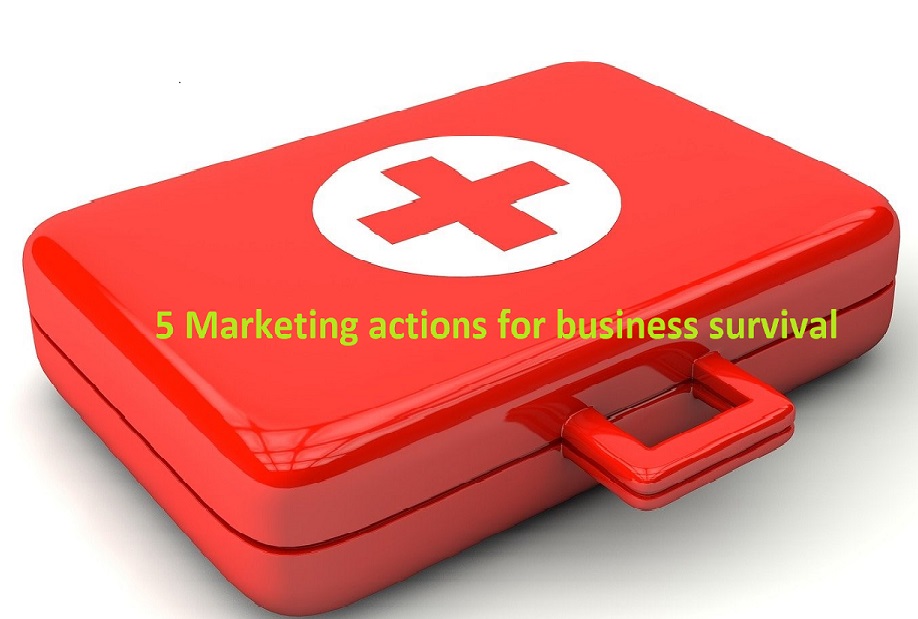There are daily changes to the way UK business works right now. Naturally, our first actions are to ensure all employees are safe and everyone in a non-essential role is working from home. Tough times mean a review of finances and likely cashflow, perhaps with some modelling of different scenarios. The knee jerk reaction for most businesses, certainly smaller businesses, is to immediately cut everything that’s seen as ‘non-essential’ which includes marketing or staff training budgets.
Immediate changes
What is happening now is changing the way we work, and there may be some activity that is novel now but will become the new ‘normal’ in the future. People in crisis will seriously consider new ideas because necessity really is the mother of invention. Many of us will change our behaviour and use our new freedom to reach out to new suppliers and sources of help. That will mean new opportunities for many businesses if they can start having the right conversations and making the right connections.
Lasting changes?
12 weeks is a game changer! Conventional wisdom tells us it takes a month to change a habit for good, so it’s dangerous to assume that these new practices will be put aside at the end of the crisis period and we’ll all go back to ‘business as usual’.
What can you do during the crisis?
Aardvark Marketing would like to share our 5-point process for analysing the state of your current and future marketing. Every business is different, so not all of this will apply to you, however having a checklist of actions you can take will get you thinking and acting in the best way to future-proof your business.
 1.
1.
-
Trim
Make lists of your current expenditure – invoiced costs are easiest but consider also the time and employees dedicated to deliver all your marketing activity.
Sort the list into things that can safely stop with little immediate impact, for example, activity promoting an upcoming trade fair or conference, things that could continue in-house and things that require external expertise, for example SEO work or new content on your website.
Some activities can probably be scaled back to a ‘hold’ level delivering savings without undermining your business.

2. Innovate
This one requires some thought. How can we deliver the same benefits for customers with a different method of delivery? Most obvious here are making use of new virtual meetings to replace the face to face meeting. For some this just makes more use of working practices they were already doing, for others it may be a steep learning curve to get everybody familiar with a new IT system. For some hospitality businesses, such as pubs or cafes, they may be able to supply a home delivery service for vulnerable people unable to get out and about as before.
If you cannot see a way to build you an immediate income stream from the innovation, then consider building community or prospective customer goodwill. Could you offer something to a charity or to essential workers to make their life easier and save them time or effort? If you can, this makes a good PR story for your business, which will pay a dividend in the future.For some, going back to a ‘barter system’ and trading our expertise with someone in another business could be a way to innovate and support each other.

3. Strengthen
If you work in a non-essential business, what you have right now is the gift of time. Time is a precious and finite commodity for most of us and we never seem to have enough of it. Why not use this time to think, to review and implement change away from the usual hectic day to day challenges you dealt with previously?
For many family businesses, this already happens when the ‘board meeting’ is the Sunday lunch discussion topic or the review time directors take when they are away from the business during the Christmas holiday.
Dust off your business plan and ask yourself if your current competitive advantage will continue to work in the future. What are your current strengths, weaknesses, opportunities and threats from your existing and new competitors? What is truly unique about your organisation and what do your existing customers truly value about your product or service? What will customers pay a premium for? Is your offering just a “me too” or is it better/different from others?
If there are real differences, does your marketing convey this to potential customers consistently and effectively?
This could be a great time to do some in-depth customer interviews to replace your day to day customer survey tick boxes.
Finally, in the strengthen section, we should consider our team. Can they use this time more productively by learning something new that will save us time or money in the future? A skills gap analysis could enable you to launch a new product or service or improve your existing systems and processes by building in-house expertise.

4. Prepare
When the crisis eases and we try to get back to normal, how will you get your customers, sales and profits back to where they used to be (or even better)? Now is the time to plan for different demand scenarios. You may face floods of old customers wanting to purchase (have you got enough stock and capacity?). Or you might be dealing with a shortage of money, lack of confidence and procrastination over key decisions which could leave your order book looking thin for many more months.
Think about these and any other possible scenarios, how you would quickly spot which one you are in and what you can do to turn around or make the most of the opportunities. Good marketing will have a role to play, whatever your situation. Most importantly, how will you know if it is working?

5. Review and learn
As we sit in the middle of an unprecedented crisis, what can we learn from the experience about ourselves and our businesses? How resilient are we to external shocks, the stuff we can’t control but can turn our world upside down.
If you haven’t done this before, now is the time to try some ‘what if…? exercises. Think about your current customers; what would happen if they suddenly stopped your contract, paid you on less favourable terms, demanded bigger discounts? How resilient is the business to an interruption in your supply chain, i.e. do you have a few key suppliers or have you the ability to switch between several for a vital component or service? Or, you might have a scale-up challenge if you suddenly needed to service ten businesses for every one you had previously and your capacity to deliver this number became squeezed. Would you have the additional expertise in-house, would you be able to quickly hire expertise to deliver this or is new recruitment of skilled employees your only option?
If cashflow can sometimes create pressure, are you setting aside a war chest? When business is good, do you still look to keep costs under control, or do you forget to review this? Do you keep some cash in a savings account for a rainy day?
Do you have good communication channels with your supply chain and your customer base? Sometimes this can involve regular contact with key people, for example if you have key account managers in place, for others this may mean mass communication via a website, social media or regular emails. Have you checked which mode of communication works best for them or do you just use what is convenient for you? When information needs to be circulated quickly and accurately, how do you achieve this?
Consider time limited offers to keep the cashflow healthier, but bear in mind these will only be effective if you have already got good communication channels in place.
Right now we have customers who are receiving new enquiries because they continued their marketing even when things got tough (remember Brexit everyone?) and some who are struggling with cashflow but want to keep some marketing in place. They are ready to recover as quickly as possible after the crisis abates. Are you?
If you’d like a free and confidential conversation about your business challenges, we’re still here to help. Call 01905 885 285 or email us and we’ll be in touch.
